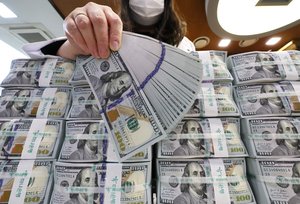
MUMBAI: The inclusion of government bonds in the JP Morgan global bond index from June 28 may not have had the desired impact on bond yields, but it did impact the forex kitty, which swelled by $5.16 billion during the week to July 5.
According to the latest weekly data, the forex reserves, a key defence for an economy against external winds, rose to a new high, touching $657.155 billion for the week to July 5. The reserves had fallen in the previous two consecutive weeks, dropping $1.713 billion to $651.997 billion for the week to June 28.
The previous high for the reserves was $655.817 billion for the week to June 7 this year.
Meanwhile, despite the positive dataprints from overseas, the rupee ended weaker, pressured by state-run banks’ dollar demand at Rs 83.56 to a dollar, down 4 paise from the previous session.
The rupee shuffled in a tight band in the first half of the session, with bids from state-run banks pushing it lower towards the latter half, according to traders.
Meanwhile, the benchmark 10-year bond yields inched up marginally by 0.06 percent to close at 6.986 from the previous week. This is the first time in weeks that the yield has fallen below the 7 percent level.
For the week to July 5, foreign currency assets, a major component of the reserves, increased by $4.228 billion to $577.11 billion, according to the RBI data released Friday.
Expressed in dollar terms, the foreign currency assets include the effect of appreciation or depreciation of non-US units like the euro, the British pound and the Japanese yen held in the foreign exchange reserves.
Reflecting the rising bullion prices, gold reserves too increased by $904 million to $57.432 billion for reporting the week, the RBI said, adding so did the special drawing rights which rose $21 million to $18.036 billion.
The country’s reserve position with the IMF rose by $4 million to $4.578 billion.
After 13 years of negotiations, the Wall Street major JP Morgan had last September announced inclusion of government of India bonds into its emerging markets government bonds index, which has already brought in more than $20 billion to the public debt instrument. Average analysis puts the incremental inflows at $2 billion a month or $20-25 billion per annum.
A rival index provider Bloomberg had also in March announced the inclusion of Gsecs into their index from January 31, which should also bring in a similar quantum of inflows to the government debt.





